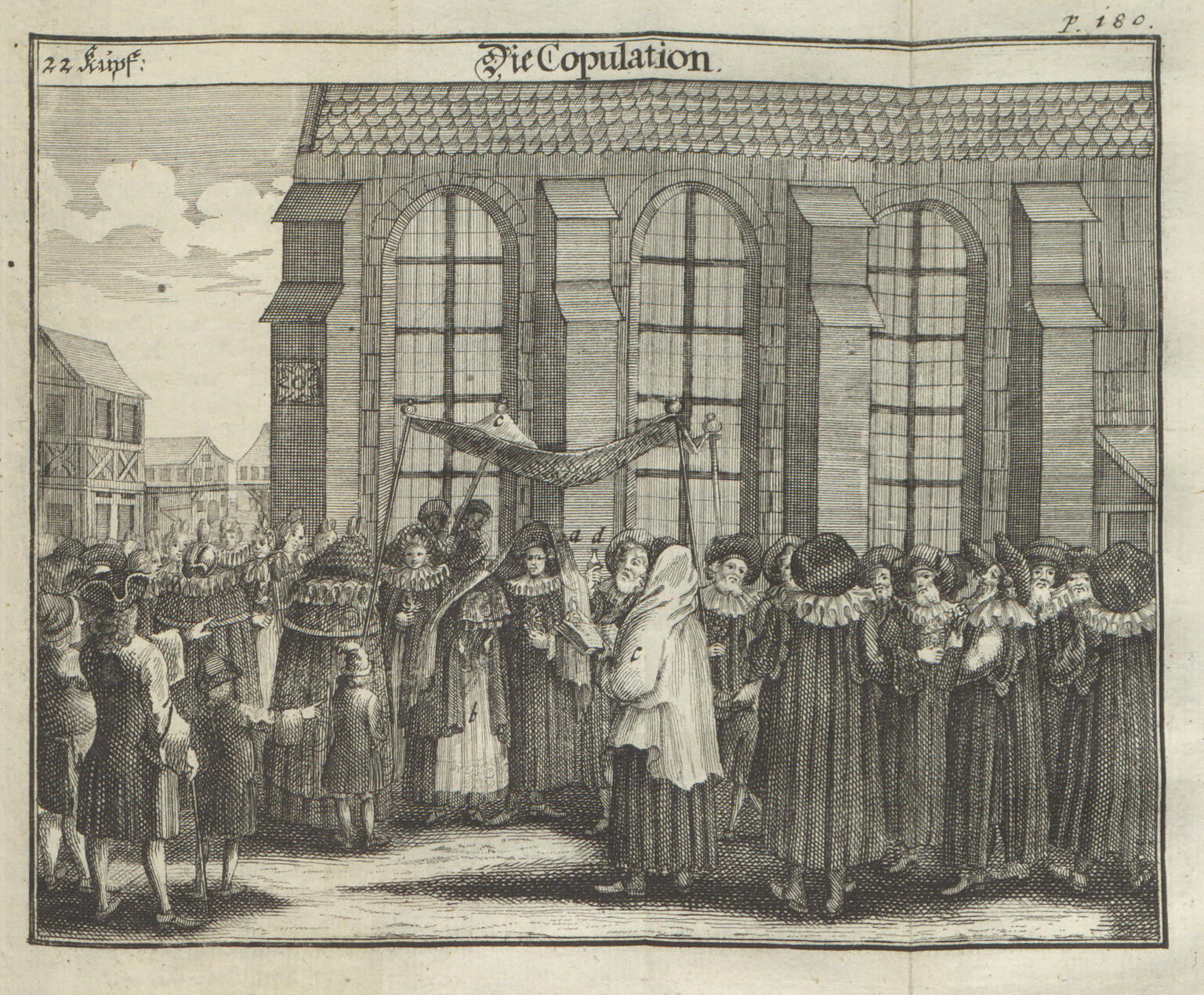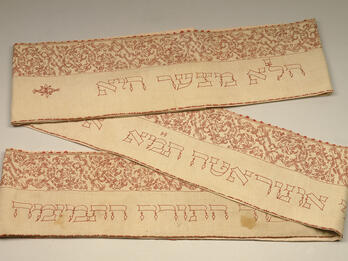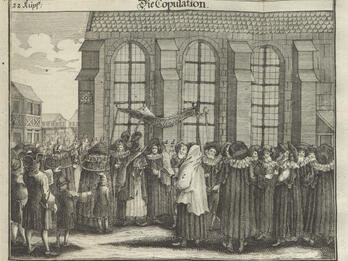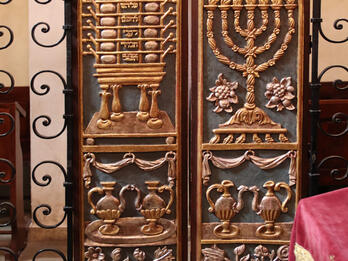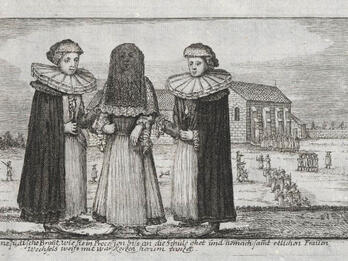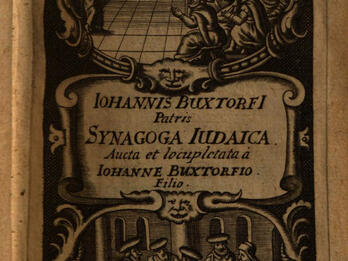Ohale Ya‘akov (The Tents of Jacob): On a Betrothal
Question: The following incident occurred: The gentlemen, R. Abraham Vidal, may he rest in peace, was married to the modest lady, Estrella, sister of the fine young man, R. David Pinto, may God protect him. Now, this Mrs. Estrella bore to this man, Reuben, a daughter called Abigail. Apparently, from the day Abigail was born it was widely known that R. Abraham Vidal intended to marry her off to his brother-in-law, R. David Pinto. There is firm testimony submitted by trustworthy witnesses that R. Abraham Vidal would frequently say that he would give his daughter as a wife to his brother-in-law, R. David Pinto. His actions indicated the same, as he always sought to instruct his brother-in-law on how to deal with officials and nobles, and he would encourage him to help in his business affairs, sending him to various cities and countries to deal with his properties. For his part too, since R. David was convinced that R. Abraham Vidal was going to give him his daughter in marriage, he worked for him with all his heart and soul.
After much time had passed, when R. David was far away, involved with R. Abraham Vidal’s business dealings as was his wont, R. Abraham’s time came, and he passed away. When R. David came back to Skopje he heard people saying that the custodians appointed over R. Abraham’s property had stated that they do not want to give the orphan Abigail as a wife to R. David. Upon hearing that this was the custodians’ plan, R. David complained that Abigail, daughter of R. Abraham, had been betrothed to him by her father. Seeking justice, he left the city of Skopje and rushed over here to Salonika. He brought his case before the city rabbis, including a [document of betrothal], signed by witnesses, which states as follows, in Ladino:
We the undersigned witnesses were present when the R. Abraham Vidal was with his brother-in-law Mr. David Pinto on the stones in front of his house and R. Abraham said to R. David that he should make a betrothal to his daughter, and this same R. Abraham told him he should do so when there are people in the synagogues. [ . . . ] R. David replied, “Sir, I want to go contentedly to where I am going.” [ . . . ] the aforementioned R. David, “You see these piastres, accept them as the kiddushin of your daughter Abigail to me before these Jewish men, and then R. Abraham replied [ . . . ] and then, for the betrothal, R. David Pinto gave ten piastres in our presence, the presence of the undersigned, and he said these words, “Be my witnesses that I am giving my honorable brother-in-law, the R. Abraham, these piastres for the betrothal of his daughter Abigail to me; and R. Abraham received them.” In witness whereof we write and sign this in Skopje on Sunday, the 14th of Av in the year 5354 counting from the Creation. Isaac Uziel David Figo.
Both of the witnesses who signed this document are still alive today, and they say that whenever they might be called upon to deliver their testimony personally in court, they are willing to do so regarding all that is written in the document of betrothal. Furthermore, the document of betrothal was ratified with the ratification of judges. R. Colon, of blessed memory, who wrote in §74 of his responsa that we should be stringent regarding documents of betrothal, and not invalidate them even if the groom retracts and says that the match never happened, and even if the witnesses also claim that it is not their signature. All the more so in a case such as this, when the groom is insistent, and the witnesses affirm that it is their signature and that the betrothal is valid, it is correct to be stringent and take the betrothal into account.
A short while later, R. David brought out a different document of betrothal, which had been written when Abigail was born, stating that she was betrothed to him by her father. The document read as follows:
Whereas the first child born to the gentleman, R. Abraham Vidal, was a daughter, whom he named Abigail at her birth. On the day of her birth, David came to his house and the father said to him, “Your partner has been born.” David responded, “The only way I can be assured that she will be my wife is if you agree to accept my betrothal on behalf of your daughter, Abigail.” R. Abraham replied, “It is better that I give her to you, than I should give her to another man (Genesis 29:19).” At that point, in our presence, the undersigned witnesses, David brought out his fine golden ring which he bore on his finger and said to us, “Be my witnesses that I am giving my ring into the hand of her father, R. Abraham, as a betrothal for his daughter, Abigail.” And as he was handing over the ring, David declared to him, “May your daughter Abigail be betrothed to me, in accordance with the law of Moses and Israel.” R. Abraham accepted it from R. David and announced, “May this be a good omen!” As proof, we signed our names on this day, Monday, 9th of Sivan, 5343 [May 30, 1583], in Skopje, and it is upheld.
This document was signed by two witnesses, and it contained the following ratification of judges: “This document was brought before the court, and these witnesses who signed it came forward and testified that it was indeed their signature. We have ratified and upheld it, as we have seen fit; all is confirmed and established: Judge So-and-So, Judge So-and-So, and Judge So-and-So.” In addition, the signatures of these judges were confirmed by a ratification of judges. Thus, by virtue of this document of betrothal, whose signatures were ratified, R. David came forward a second time, again contending that Abigail had been betrothed to him by her father.
When many of the dignitaries of Salonika and people in the know heard this claim from R. David, they said to him, “Why would you betroth this girl through her father twice?! If it is true that you betrothed her on the day of her birth, through her father, why was it necessary for you to betroth her again in the month of Av, of the year 5354 [July 1594]?” R. David responded with the following argument: It is indeed correct that there was no need for him to betroth her a second time, as she was already betrothed to him. However, circumstances necessitated this move, for when she was originally betrothed to him by her father, he was roughly fourteen years old at the time, and his elder brother took care of his affairs. This brother dictated the text of the document of betrothal and arranged for available witnesses to sign the document. Likewise, it was he who had the judges ratify the document, which he kept in his possession, in safekeeping for an hour of need. Now, at the time the young David himself did not imagine what would unfold much later on. But when he grew up and became a dedicated assistant to his brother-in-law, R. Abraham Vidal, and he saw that the girl was not given to him as a wife [see Genesis 38:14], and that the betrothal had not been publicized at the appropriate time—for he had matured and was already a man—he became concerned about that first document of betrothal, since it had been hidden away by his elder brother, for his brother had passed away, his property had moved on, and the document was nowhere to be found.
When he realized that the document was lost, R. David did not want to approach his brother-in-law, R. Abraham Vidal, based on that first betrothal, since he could not produce the document. Instead, he spoke with him in a friendly manner, as he knew that R. Abraham was on good terms with him, and the latter agreed in principle to announce the betrothal upon his return from Constantinople. However, he maintained that as many of the residents of the city would be busy in the villages, it would not be a good time to publicize the match. Accordingly, R. David suggested that he accept a betrothal from him for his daughter Abigail, so that he, David, could feel secure in the arrangement and not have to think about other possible matches.
All this was R. David’s idea, in order to renew the betrothal, as the initial arrangement had been largely forgotten. Furthermore, the original document of betrothal was lost, due to the absence of his elder brother, which meant that he had no ready proof that it had ever occurred. He therefore came up with this plan, to which R. Abraham agreed, and he accepted the betrothal for him on behalf of his daughter. Subsequently—R. David argued—God had mercy upon him, as He saw his suffering and toil, as he had served his brother-in-law R. Abraham with great devotion and honesty for several years, and the original document of betrothal was found. Consequently, R. David produced that document as well and came forward in virtue of both documents, since both had been fully ratified by the court.
In addition to the fact that both documents had been upheld in court, and no further claim was required to validate the betrothal, R. David submitted further arguments and convincing rationales as to why the girl was designated for him: First, several credible witnesses, as well as elders of the city, are aware that R. Abraham Vidal had clearly stated in public that his brother-in-law, R. David Pinto, was his son-in-law. Many respectable individuals maintain that they asked R. Abraham who this R. David was, and he answered, “He is my brother-in-law and son-in-law.” This is attested by figures who have a reputation for honesty, not merely by others who attribute such comments to them, and thus it was publicly known that from the day she was born, Abigail was intended for David, her uncle.
A second, substantial proof is that when the pair were in Constantinople, various fine proposals were suggested to R. David, but when R. Abraham heard about them, he told the matchmakers to refrain from speaking about such matters, as “He is my son-in-law.” Yet another proof and justification is that there is reliable witness testimony that the damask and atlas garments that Abigail owns were purchased and prepared for her by R. David, with his own money. Likewise, he also bought for her other fine-quality embroidered robes, including one that has a strand of beaten gold weighing seventeen meticals [a unit of weight, from the Arabic mithqal], as well as other valuable items and also shoes. R. David gave her all these expensive gifts, which she wears to this day. Now, a person would buy such luxuries only for his betrothed, and regarding each item R. David claims that he can bring sound witnesses; let them bring their witnesses, that they may be justified (Isaiah 43:9).
Furthermore, the witnesses who signed the document of betrothal in 5354 [1594] are willing to testify this day about the betrothal itself. Thus, in light of all the convincing aforementioned reasons, explanations, and justifications, the validity of this betrothal should not be questioned at all. Regarding all this, may our rabbis, who issue rulings of halakhah, instruct us on how to treat this betrothal. For we await their verdict, to teach us the law and to remove a stumbling-block from the path of the people of God [see Isaiah 57:14]. May their throne of Torah be raised high and lofty [see Isaiah 57:14] with great strength and peace; Amen, forever, Selah.
Translated by
and
.
Credits
Jacob (ben Abraham) Castro, Sefer ohole Yaʻakov (The Tents of Jacob) (Livorno: Bi-defus ha-shutafim A. Y. Kastilo, E. Saʻadun, 1783), pp. 96v–101r (question 56).
Published in: The Posen Library of Jewish Culture and Civilization, vol. 5.


